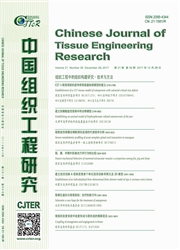

 中文摘要:
中文摘要:
背景:骨折愈合是成骨细胞与破骨细胞耦联相互作用相互影响促进骨质生长的过程,其中成骨细胞介导骨的形成,破骨细胞介导骨吸收,使骨重建处于一种动态平衡中,于动态平衡环境中促进骨生长,而目前研究多数倾向于单独的成骨或者破骨机制,但会忽略这两种细胞共同存在的环境下相互作用机制。目的:观察补肾接骨中药对成骨与破骨细胞耦联中骨护骨素-核因子κB受体激活剂的配基-核因κB受体活化因子的影响及其在骨折治疗中的作用机制。方法:分离小鼠成骨、破骨细胞并体外细胞培养,建立小鼠"成骨-破骨细胞共育系"作为研究平台,补肾接骨中药1.25,2.5,6.25 g/(kg?d)灌胃,空白对照组给予同等体积的生理盐水灌胃,每日1次,连续7 d。结果与结论:共育培养24 h后,成骨细胞内碱性磷酸酶水平明显高于单纯培养的成骨细胞(P〈0.05)。实时PCR检测显示,共育体系细胞中碱性磷酸酶、Runx2及骨护骨素表达增加(P〈0.05),呈剂量依赖性(P〈0.05)。Western-blot检测显示,高浓度[6.25 g/(kg?d)]中药能明显促进骨护骨素、核因子κB受体激活剂的配基的表达,抑制核因子κB受体活化因子蛋白表达(P〈0.05)。结果证实,补肾接骨中药可动态调节骨护骨素-核因子κB受体激活剂的配基-核因子κB受体活化因子信号通路,对促进骨组织重建与恢复有着积极的作用。
 英文摘要:
英文摘要:
BACKGROUND: Fracture healing is the coupling interaction of osteoblasts and osteoclasts that promotes bone growth, in which osteoblast-mediated bone resorption and osteoclasts-mediated bone reconstruction make the bone reconstruction in a dynamic equilibrium to promote bone growth. However, the majorities of the current studies focus on ostecgenic or osteoclastic mechanism alone, and ignore the interaction mechanism between these two cells under co-existing conditions. OBJECTIVE: To investigate the effects of Kidney Chinese Herbs on osteoblasts and osteoclasts coupling of osteoprotegerin-receptor activator of nuclear factor kappaB ligand-receptor activator of nuclear factor kappaB and its mechanism of action in fracture treatment. METHODS: Mouse osteoblasts and osteoclasts were isolated and cultured in vitro to establish the mouse "osteoblast-osteoclast co-culture system" as a research platform. Then, Kidney Chinese Herbs at doses of 1.25, 2.5, 6.25 g/(kg·d) were given intragastrically for 7 consecutive days. Mice in the blank control group were fed with the same volume of normal saline.RESULTS AND CONCLUSION: The alkaline phosphatase activity in osteoblasts co-cultured with osteoclasts was significantly higher than that in osteoblasts cultured alone at 24 hours of culture (P 〈 0.05). Real-time PCR showed that in the co-culture system, the expression of alkaline phosphatase, Runt related transcription factor 2 and osteoprotegerin were increased in a dose-dependent manner (P 〈 0.05). Western blot assay showed 6.25 g/(kg.d) Kidney Chinese Herbs could dramatically promote the expression of osteoprotegerin and receptor activator of nuclear factor kappaB ligand, but restrained the expression of receptor activator of nuclear factor kappaB (P 〈 0.05). These findings indicate that Kidney Chinese Herbs can dynamically regulate the osteoprotegerin-raceptor activator of nuclear factor kappaB tigand-receptor activator signaling pathway, and has a positive effect to promote bone reconstr
 同期刊论文项目
同期刊论文项目
 同项目期刊论文
同项目期刊论文
 期刊信息
期刊信息
